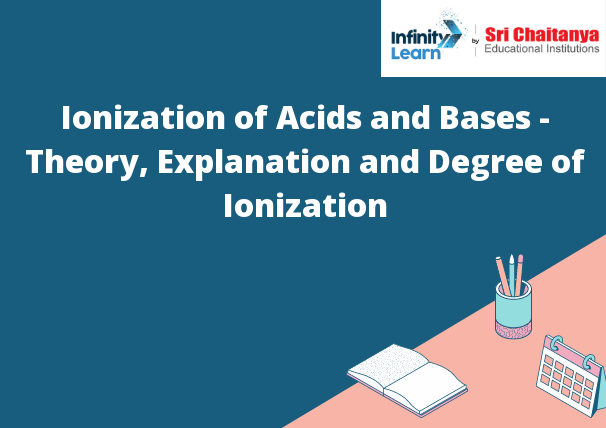Table of Contents
Introduction to Ionization
Ionization is the process of removing one or more electrons from an atom or molecule, resulting in the formation of an ion. Ions can be positive or negative, depending on the number of electrons they have lost or gained. In most cases, ionization is a result of either heating the substance or exposing it to radiation.

Arrhenius Theory
The Arrhenius theory is a theory that explains how chemical reactions occur. The theory states that when two substances are combined, they react to form a new substance. The reaction is caused by the transfer of electrons between the two substances.
Explanation
Acids and bases are two of the most important classes of molecules in chemistry. Acids are molecules that donate protons (hydrogen ions, H+) to other molecules, while bases are molecules that accept protons. The strength of an acid or base is determined by how easily it donates or accepts protons. The degree of ionization of an acid or base is a measure of how easily it donates or accepts protons.
The degree of ionization of an acid can be measured by its acid dissociation constant, Ka. The acid dissociation constant is a measure of the strength of an acid. It is the equilibrium constant for the dissociation of an acid into a proton and a molecule of the acid. The acid dissociation constant is given by the equation
Ka = [H+][A-]/[HA]
where [H+] is the concentration of protons, [A-] is the concentration of the acid, and [HA] is the concentration of the acid molecule. The larger the acid dissociation constant, the stronger the acid.
The degree of ionization of a base can be measured by its base dissociation constant, Kb. The base dissociation constant is a measure of the strength of a base. It is the equilibrium constant for the dissociation of a base into a proton and a molecule of the base. The base dissociation constant is given by the equation
Kb = [H+][B+]/[HB]
where [H+] is the concentration of protons, [B+] is the concentration of the base, and [HB] is the concentration of the base molecule. The larger the base dissociation constant, the stronger the base.
Ionization of a Compound
When a compound is dissolved in water, the water molecules can form strong hydrogen bonds with the compound’s molecules. This interaction causes the compound to break up into individual ions. The positively charged hydrogen atoms in the water molecules are attracted to the negatively charged ions in the compound, and the negatively charged oxygen atoms in the water molecules are attracted to the positively charged ions in the compound. This interaction causes the ions to move away from each other, and it also creates electrical current.
Ionization of Acids and Bases
An acid is a molecule that donates a proton (H+) to a base. A base is a molecule that accepts a proton from an acid. The strength of an acid or base is measured by its ability to donate or accept protons. The stronger the acid or base, the more easily it donates or accepts protons.
The following table lists some common acids and bases, their strengths, and the products of their ionization reactions.
Degree of Ionization
A measure of how much a gas or liquid has been ionized. The higher the degree of ionization, the greater the number of ions in the gas or liquid.
Arrhenius Concept of Acid and Base Ionization
An acid is a molecule that donates a proton (H+) to a base. A base is a molecule that accepts a proton from an acid.
Acid Ionization:
HA → H+ + A-
Base Ionization:
B+ + OH- → BOH





